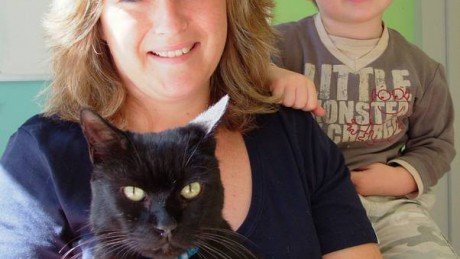
As a vet, it can be difficult to leave your job behind you, even when you go on holidays overseas. When visiting North America recently, I met a dog out for a walk in a park, but she was a dog with a difference. It would be more accurate to say that her front legs were “out for a walk”, whereas her back legs were “out for a trundle”. Teva was in a specially adapted wheelchair, as you can see from her photograph. I stopped and had a long chat with the dog, Teva, and her owner, Alison. Wheelchairs for dogs are not new, but it is very rare to see them in Ireland. I found it very interesting and useful to obtain a first-hand account about an animal who has successfully adapted to a complete new means of mobility.
Teva’s problems started when she was very young. She suffered from a severe form of hip dysplasia, which is a congenital form of abnormality of the hip joints. She was able to move around reasonably well, because she was a small dog, but her back legs were always weak as a result. Last year, she suffered a further problem with her right hind leg. She developed ruptured cruciate ligaments in her right knee, which resulted in complete loss of use of the leg. Her left leg, already weakened from the hip problem, was then unable to support Teva’s full weight. She was only able to move by dragging both back legs behind her. At first, it was hoped that Teva would return to normal when the ligaments in her knee were repaired, but unfortunately, even after complex surgery, Teva was unable to stand up or walk on her hind legs. She continued to drag them behind her, and she began to develop scuffed, sore areas where she was rubbing on the ground. She was unable to go for walks at all, and Alison began to worry about her quality of life.
It was at this stage that she began to investigate the use of a wheelchair to help Teva. She found an excellent website – www.eddieswheels.com – which offers mail-order wheelchairs for pets, together with plenty of advice in their use. Alison took various measurements from Teva, completed an on-line order form, and after further discussions by phone and email, she ordered a custom-designed wheelchair. Teva’s wheelchair is a lightweight aluminum construction, with a welded frame, machined fittings, stainless steel bolts and nuts, and plenty of foam padding to keep her comfortable at contact points. The harness at the front is well designed, so that Teva can be easily slotted in and out, as needed. She sleeps without the wheelchair, but she remains connected through most of the day, allowing her to move around as she pleases, just like any normal dog. The wheelchair was not cheap, at around $400 (€320) but it is clearly a high quality product, made of durable materials that will last for many years.
Dog wheelchairs are most commonly used for incurable spinal problems, such as paralysis following a broken back, or a severe slipped disc. Such dogs adapt remarkably well to life on wheels, but there are often additional difficulties to deal with, such as severe incontinence and the resulting hygiene problems. Although the use of a wheelchair in these cases does allow an extended stretch of life, it is not always an easy answer, and many people choose euthanasia instead.
Teva is fortunate in that she does not suffer from incontinence of any kind. Her spinal function is normal – her problem is specifically the loss of use of her hind legs due to the abnormalities of her hips and knees. This means that once she is in her wheelchair, she will happily go into the garden and “do her business” in the same was as any other dog. She lives with another small dog, and the two dogs often play together as if there is nothing wrong with Teva. Her wheels are very stable, and can even cope with rough ground. She lives as full a life as she did before her knee problem.
Teva is eleven years old now, and as a Corgi, she could live for another four or five years. Thanks to her wheelchair, those years are likely to be full and active years, with plenty of enjoyment of life. It was a pleasure to meet Alison and Teva while I was on holiday – they are a great example of a good pet-owner team. Teva is a friendly, good-natured animal, and Alison is a loving owner who is completely committed to the well-being of her much loved pet.
Tips
- Wheelchairs for dogs can provide good quality of life for dogs with severe mobility problems
- Cases need to be chosen very carefully, since they do not work well in every case
- Your vet will help you to decide if your dog has a suitable type of condition




Comments are closed.
Please note that I am unable to answer veterinary questions in comments. If you have questions or concerns about your pet's health it is always better to contact your vet.